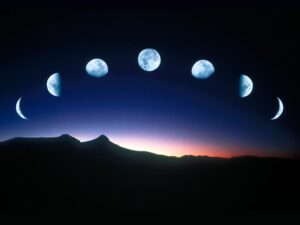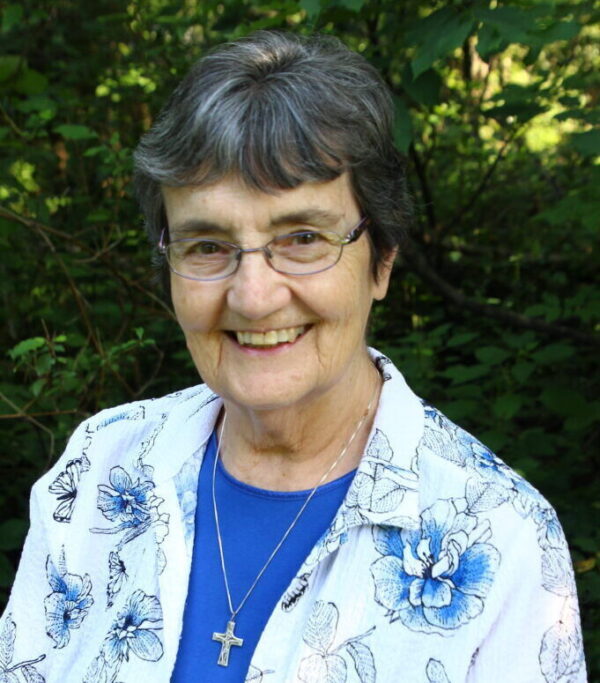Is your spirituality solar or lunar? That’s the question raised in a new book by Barbara Brown Taylor called Learning to Walk in the Dark. Taylor, an award winning writer, is an ordained Episcopal priest who left parish ministry about fifteen years ago and now teaches world religions at Piedmont College in northern Georgia. According to Taylor, many of us have a negative attitude toward darkness. In fact, we are taught to fear darkness even as children  when our parents yelled to us from the house, “Come inside now, it’s getting dark.” The Bible too speaks negatively of darkness. There are only about 100 references to darkness in the Bible, and they all say, “Darkness is bad news.” We tend to overlook the good things in the Bible that occurred at night, in the dark. God took Abraham out at night and pointed to the stars, promising him a son. Later Abraham’s grandson Jacob has a powerful dream at night in which he sees a ladder with angels ascending and descending on it. This ladder became a commanding reminder to him that God was with him always. Later Jacob wrestles with an angel all night long, receiving a special blessing and a new name (and a limp!) The mighty Exodus occurs at night, and when God speaks to Moses in the desert, God does so in a dark, dense cloud.
when our parents yelled to us from the house, “Come inside now, it’s getting dark.” The Bible too speaks negatively of darkness. There are only about 100 references to darkness in the Bible, and they all say, “Darkness is bad news.” We tend to overlook the good things in the Bible that occurred at night, in the dark. God took Abraham out at night and pointed to the stars, promising him a son. Later Abraham’s grandson Jacob has a powerful dream at night in which he sees a ladder with angels ascending and descending on it. This ladder became a commanding reminder to him that God was with him always. Later Jacob wrestles with an angel all night long, receiving a special blessing and a new name (and a limp!) The mighty Exodus occurs at night, and when God speaks to Moses in the desert, God does so in a dark, dense cloud.
In the New Testament, Joseph was tossing and turning at night when a heavenly messenger encourages him to take Mary as his wife and raise her child as his own. Tradition tells us Jesus was born in a stable (probably really a cave) at night. Later Jesus would describe what real love looks like: a grain of wheat breaking open in the darkness of the soil. And when Jesus dies in total self-surrender on the cross in the middle of the day, darkness covers the earth. The message of these incidents seems clear: God dwells and moves and blesses in the darkness as well as the light.
Taylor believes that Christianity preaches a spirituality that is sometimes too solar. It often identifies God’s presence with the “sunny part” of our lives. If we have faith, a solar spirituality says, then we will always feel God’s presence, we will have certainty of belief, and we  will have reliable answers to our questions and prayers. The problem with this comes when darkness descends on our lives: we lose our job, our marriage falls apart, we have a serious health issue, we struggle with one of our children, we begin to doubt what we have always believed, God seems very far away. According to Taylor we need a more lunar spirituality. She writes, “When I go out on my porch, the moon never looks the same way twice. Some nights it is as round as a headlight; other nights it is thinner than the sickle hanging in my garage. Some nights it is high in the sky, and other nights low over the mountains. Some nights it is altogether gone, leaving a vast web of stars that are brighter in its absence. All in all, the moon is a truer mirror for my soul than the sun that looks the same way every day.” She encourages us to trust the rhythm of light and darkness in our lives, rather than oppose it.
will have reliable answers to our questions and prayers. The problem with this comes when darkness descends on our lives: we lose our job, our marriage falls apart, we have a serious health issue, we struggle with one of our children, we begin to doubt what we have always believed, God seems very far away. According to Taylor we need a more lunar spirituality. She writes, “When I go out on my porch, the moon never looks the same way twice. Some nights it is as round as a headlight; other nights it is thinner than the sickle hanging in my garage. Some nights it is high in the sky, and other nights low over the mountains. Some nights it is altogether gone, leaving a vast web of stars that are brighter in its absence. All in all, the moon is a truer mirror for my soul than the sun that looks the same way every day.” She encourages us to trust the rhythm of light and darkness in our lives, rather than oppose it.
Taylor’s book called me to reflect on my own spirituality—and the one I speak and write about. These are some questions I asked myself. You may find them helpful for your own reflection.
Is my spirituality too solar? Do I tend to equate God’s presence only with the light?
Can I find beauty in the natural darkness? Taylor describes sitting outside with her husband and watching a moonrise. I asked myself, “When was the last time I sat and watched a moonrise? How aware am I of the phases of the moon?
Can I find God in the darkness of my soul, the darkness of my personal life, and the darkness of the world?
Do I welcome the darkness as a friend who can help teach me what I need to know?
Do you have any thoughts on this topic that you’d like to share with us?






14 Responses
Interesting reflection Sr. Melannie. The dark night of the soul is hard to push through at times. It may be that not knowing that lead to God’s revelation.
Thanks for reminding me to gaze at the moon more.
Blessings!
Kathleen
Thanks Melanie! Once again, I feel affirmed. I see so much potential
in darkness. How else can I see light in the tunnel, under the door, in the dark places? I love the ambiance of the low lights.
Like you Sr. Melannie, I grew up in the country, so nighttime was not a scary time – we loved to listen to the peepers in the Spring, and the night birds, and the snorting of deer. I never used a flashlight since once you let your eyes adjust, you could see just fine.
My husband was raised in town, and he always admonishes me to “take a flashlight”, which is of course the prudent thing to do. Nowadays, I am more fearful of the dark – not of animals but of other humans – and I wear all kinds of reflective gear if I go walking at night.
I totally agree with the line “the moon is a truer mirror for my soul than the sun that looks the same way every day”. I am inspired to go out & see the moonrise!
Thanks, Sr. Melannie: One of my favorite things to do is to settle into a comfortable chair (without any lighting at all) in the late afternoon and let the darkness slowly cover me as it becomes later and later. It is a great time to meditate and pray and prepare for the evening… as well as listen to far and near sounds that I ordinarily would miss in the busyness of the evening. Unfortunately, I do not have many chances to do this, but when I do, I take advantage of the ultimate stillness of it all.
Melannie, thanks so much for this reflection. I love the moon and the darkness. I have often led and written reflections about the good things that happen in the darkness.
Blessings,
Marietta
What a beautiful and positive reflection. I have always been afraid of the dark when I am alone. My Mother always said “nothing good happens after dark” and I guess I believed her! I am changing my “stinkin thinkin”! Thank You.
Hi Melannie!
I’m definitely a moon and star person! A star-studded night is one of the greatest gifts for me. It takes me into the fastness and wonder of our God.
Also, closely before dawn I often receive insights I believe come from the Holy Spirit.
Thanks for this amazing and insightful topic.
Carol
Sr. Melanie, thank you. My favorite time is the morning darkness. I get up, fix a cup of coffee, will meditate for awhile and then say my morning prayers. The morning darkness is peaceful and the stillness reminds me that we all need that time to wait and hear God’s voice.
One of my favorite times to pray is after 11 p.m. in chapel in the dark. There’s no one but me usually and the external distractions are minimal.
Two images come to mind: nighttime tours of Yosemite and Washington D.C. During daylight hours, both locations present a multitude of distractions, taking away from what is worthy of one’s attention. Only at night is the moonlight or artificial lighting capable of focusing one’s attention on what is worth taking note of and remembering, such as half dome or the Lincoln Memorial. And so it is on one’s spiritual tour of life.
An interesting response rose up in me: I was reminded of the ’60’s song
“Hello, darkness, my old friend. I’ve come to speak with you again. . . in the Sounds of Silence”. I haven’t thought of that for a long time, and will have to go back to study the lyrics again, but I remember being struck by the fact that the poet calls it “my old friend”, which is pretty much our own experience, because we all are acquainted with darkness in our lives. But the contrast between darkness and light is age-old, reminding us that Christ IS our light — whether in the darkness or daylight!
Thanks for this perspective!
I love to go out at night and look at the moon and stars. What an awesome sight. Then I marvel that God loves more than all of it. Thank you Lord. I love you, too!
If I say “let the darkness hide me, and the light around me be night, even darkness is not dark for you and the night us as clear as the day…”
Psalm 139
Good reflection, thank you! Thomas Moore (“Dark Nights of the Soul”) also has a lot to say about night/lunar spirituality.